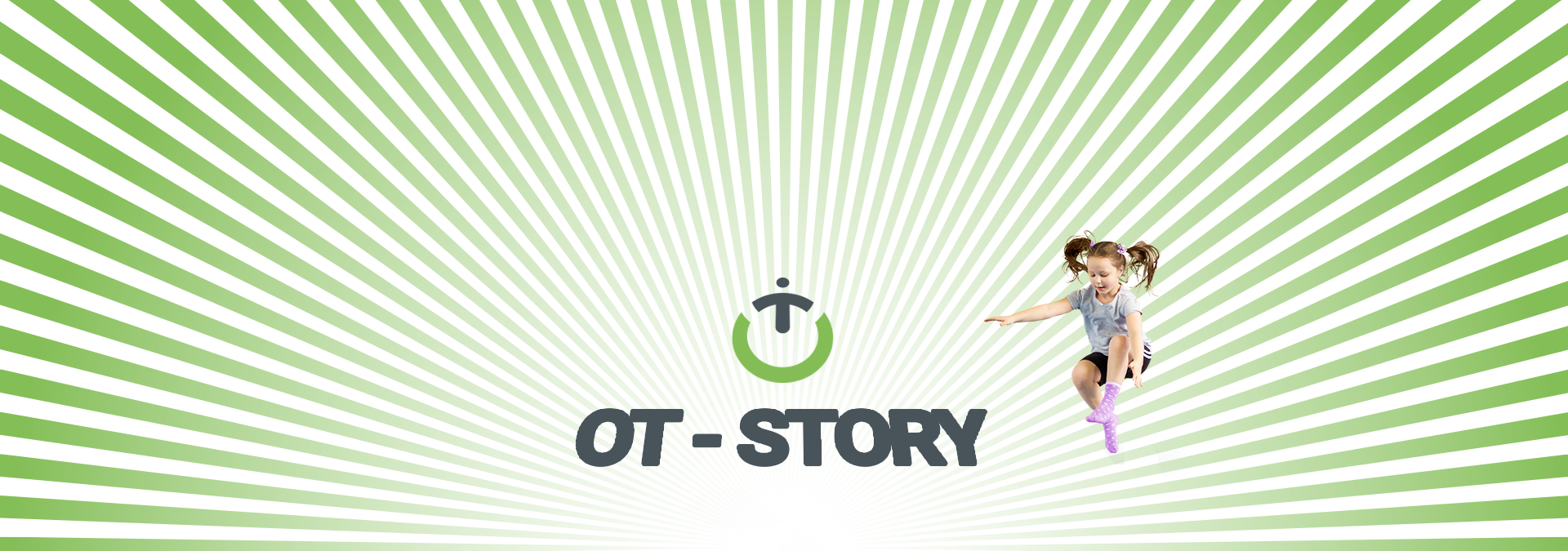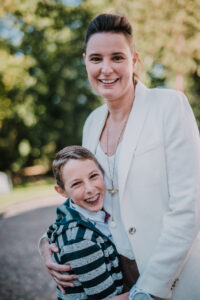
OT-story Ellen: an autism-friendly label for sports clubs. Ellen is working on it!
From top athlete in basketball to committed mother and ‘auticoach’. Ellen de Stoop has a son with Autism. As a result, she often encounters challenges and that drives her to normalize Autism. She wants to create broad support in sports clubs for children who are ‘different’, with an autism-friendly label, for example.

You have been involved in top sport for 18 years. Tell us briefly about your basketball career.
I had to stop judo at 16 because I had a growth spurt. The doctor advised me to play volleyball or basketball. At the time, I had a friend in class, Dana Boonen, who took me to basketball practice.
I started in Tissac Gentbrugge in 2nd provincial and thanks to my stature I was able to quickly grow to bigger clubs in the first national. I was 18 when I was allowed to play at Gentson in the U23 and the first team and the following year directly to the vice champion Waregem. Then I combined studies and sports and it was all easy to combine.
I played in Kortrijk, Aalst, Stars Gent, Sint-Katelijne-Waver, Roeselare and Gentson. Then I was pregnant with my first child, Mika. After the delivery I continued to play at Gentson, Waregem, Willebroek and Laarne.
The combination of family, work and sport was not always obvious, but the love for the ball remained until I became pregnant with our daughter Sam when I was 39e. I then hesitated for a while about getting my trainer’s diploma, but I had another idea that had been playing in my head for a while.
You have your own company in marketing and office management, but you have followed a postgraduate course in Autism. Why ?
My son has autism. The diagnosis was made quite early. As a parent and top athlete I have often had the feeling of running into a wall. You are not guided enough and you have to figure out a lot of things yourself. As a parent, this is also a processing process that you have to go through. I wanted to know more about what goes on in the mind of my own child and that of others.
After my sporting career, I really wanted to delve deeper into psychology and the subject of Autism. I had attended a parent course to better understand and guide your child at home. This training gave me the idea to become an ‘auticoach’. I then applied for the postgraduate degree at Artevelde University College Ghent and was allowed to start in September 2020. We were 20 students in the group from all kinds of sectors and successfully completed our studies in June 2021.
If you have autism, it can be extra difficult to find a sport that suits you.
Your son also wanted to play basketball, but that turned out not to be obvious.
No, that is not obvious either. There are so many stimuli that come to you when you exercise. As neurotypical people (people without autism) you can filter these stimuli and give them a place. People with autism cannot do this. They often cannot do without predictability and a good clear planning. They have to be in a certain flow to learn things, and how to get into that flow requires a little knowledge of autism and of the player!
Mika drowned in the group. He often did not understand the assignment because he did not see the bigger picture. He was also often misunderstood and labeled as ‘stupid’. Often there were also trainer changes, so that he did not really connect or that the coach did not know about his problems and then the coach came to me afterwards: “your son is really a difficult child and he does not listen!”. Pleasant is different isn’t it!
I then said that I do not want to do this to my child: the stress, the building up of fear of failure and being laughed at by others because he did not understand or did something wrong.
Could adapted Sport (G-sport) be part of a solution? Don’t they take the possibilities of the child into account?
G-sport (adapted sports) is a solution for children with a physical disability, mental retardation or psychological problems. The coaches are specifically trained for this.
Children with normal giftedness often do not belong there. It is a very big step from the regular sports club to a G sports club. But still great that G-sport exists! Because this way everyone can exercise, no matter how small or how big the disability is…
You want coaches, but also board members to deal more consciously with children with disabilities. How do you do that?
I made an overview for the coaches of things they might encounter during training. I start from a story with cases so that they can often recognize situations or actions. I also give tips on what can and cannot be done. I also made some material that they can use in training such as an emotion meter or planning tool. I could also participate in a training and first map out the situation and then give tips.
For the board members I am aiming more at a meeting, so that I can set out the guidelines for a certain policy in the club: “children with autism are welcome here!” A kind of support must be outlined and the volunteers must be willing to commit themselves to this (because clubs work almost exclusively with volunteers and parents of the children who play sports there). They also need to know what autism is and how to deal with it, they also need to be sensitized here, together with the coaches.
Are you hearing from the government or Sport Vlaanderen?
I have no idea how to ring the bell there. Strengtheners in autism (VVA) invited me recently and I told my story there. They want to work with me in the future to make as many sports and leisure associations as possible autism-friendly.
On November 11, I was invited by Basket Vlaanderen to give an off-court clinic about dealing with kids and young people with autism in basketball. So now I am mainly in the basketball environment because I was raised in it myself 😊
But I really see it bigger: there are so many children who start playing sports and drop out because they are not understood because they are “different”…and they do have talent… I want to help these children and give them a place in our society. These are the children who later go on to study and try to conquer a place in the labor market. After all, they have to trust somewhere and be able to have and maintain a good feeling. Sport makes people happy and brings them together, right?
Children are hard on each other, but parents next to the field also show no understanding. How can we solve this ? Perhaps it is often ignorance too?
Yes, often out of ignorance and often there is also a taboo surrounding autism. But if the club were to work with an “autism-friendly label” and communicate openly that children with autism are welcome, it is up to the parents and board members to address and inform the people in the stands about this as well. Increasing support is the message…
Information evenings can also bring solace here, or invite the youth teams with the parents to explain what autism is and say that these children are worked in this club.
What is your greatest wish?
My greatest wish is to turn this passion into my profession. To be able to deliver my message to clubs all over Europe and to see that it catches on. But I’m starting in Flanders, there’s plenty of work to do there 😊
